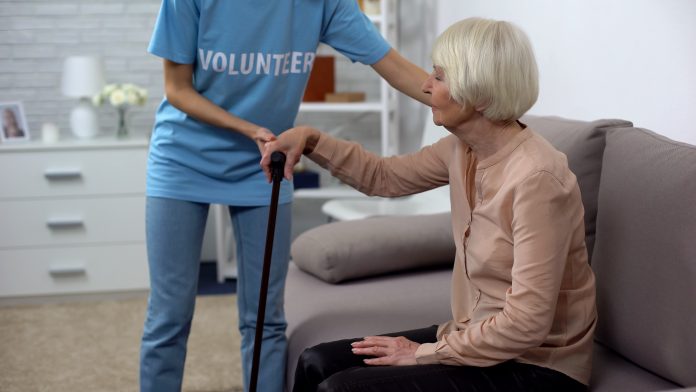Here, Paddy Hanrahan, Strategy & Innovation Director at Helpforce, tackles five major misconceptions around volunteering for the NHS, setting the facts from fiction
Volunteers play a vital part in supporting NHS staff to deliver good patient care. Volunteering is good for the people being supported, health and social care services, the volunteers themselves and the community as a whole. And yet, certain misunderstandings and myths about volunteers remain.
Myth 1: Healthcare volunteers are a ‘nice to have’ and don’t contribute towards ‘hard’ health measures
Reality: We know through our work with a wide range of NHS trusts that volunteering brings measurable benefits to NHS Trusts, staff and patients. Feedback from patients consistently indicates that volunteers have a positive impact on patient experience and care quality. When volunteers are built into the design of health and care services from the beginning, they can be transformative.
For example, volunteers can play an important role in helping patients leave the hospital on time. When volunteers support patients with exercise and movement, patients are less likely to be re-referred to physiotherapy. In addition, 100% of patients supported by volunteers at mealtimes say they always get enough to drink during their meals. And other volunteer roles are proven to speed up patient discharge by 44 minutes per patient. (Volunteer Innovators Programme, 2020).
Whether it be accompanying patients from home to hospital, providing reassurance during surgery, or taking time to settle people back at home following a hospital stay – volunteers play a vital role alongside staff. Research by the King’s Fund shows that more than 70% of the staff agree that volunteering in hospitals adds value for patients, staff, and for volunteers themselves.
Areas such as getting people to and from the hospital, helping patients recover in their homes, or assisting people as they navigate their way through the health service more generally, aren’t ‘nice to have’ elements of healthcare; they are essential to ensuring high-quality patient care.
There is also clear evidence that volunteering improves wellbeing for the volunteers themselves. Recent research showed that levels of wellbeing increased significantly for people who participated in the NHS Volunteer Responders programme.
Myth 2: Volunteers can only carry out a limited number of roles in the health and care system
Reality: As the NHS Long Term Plan sets out, “volunteers contribute across a range of NHS roles” across different settings. This ranges from accompanying patients during their journey through the hospital and back home again, to providing companionship for people at the end of their life; and from being a blood courier to collecting prescriptions for patients to speed up their discharge from hospital. Bereavement volunteers provide practical and emotional help after the death of a loved one, while other volunteers give their time to reassure elderly people who may be worried about how they will cope when they return home after discharge.
With evolving patient needs, the innovative ways that volunteers can support patients and staff continue to grow – and healthcare leaders have the opportunity to integrate volunteers into many more aspects of service delivery. Volunteers can be a vital missing link in the care pathway – often providing vital help for patients who do not have their own family or other support networks.
Although volunteering has proven positive outcomes, and although there is a significant public interest in volunteering, volunteers are still an untapped resource across many settings and roles. This has to change, and fast so that more patients, staff, communities and volunteers can reap the benefits. To help accelerate change, and integrate volunteers into all aspects of patient care, we need far greater collaboration both within health and care settings and between the organisations providing care.
Myth 3: Volunteers threaten the jobs of paid NHS staff
Reality: Volunteers will never be a substitute or replacement for paid NHS staff. This commitment underpins the charter that Helpforce worked with Unison to launch in April 2019, which aims to reassure staff and volunteers alike with guidelines that fit within the NHS long-term plan.
The charter sets clear boundaries for the managers of volunteer services and encourages them to work with health employees to develop roles that support the patient experience, without undermining paid staff.
Volunteers play an important and complementary role alongside brilliant NHS staff, allowing them more time to focus on providing expert medical care. NHS staff consistently tell us that they value the contribution of volunteers – as highlighted through our Volunteering Innovators Programme. 82% of staff who get support from volunteers feel they are able to deliver the care they aspire to, compared with 70% of staff who don’t have volunteer support.
Myth 4: Volunteers aren’t safe or reliable
Reality: NHS Volunteers undergo the same safety checks that NHS employees have to go through, including having to pass DBS checks and providing recommendation letters. In addition, they all receive training to equip them for their role and ensure they can support staff and patients safely.
Nurses estimate that volunteers free up an average of 26 minutes per nurse per day, enabling them to focus on priority clinical tasks, and support more patients. 95% of patients say volunteers help them feel less anxious during surgery.
A physiotherapist at Sandwell and West Birmingham Hospitals NHS Trust said: “Not having spent much time with volunteers I was unaware of the vital role they play within the hospital setting. I have been pleasantly surprised with the level of care and support they offer patients. Definitely an asset to the trust!” (Volunteering InnovatorProgramme, 2020)
Myth 5: The time and cost needed to train and manage volunteers is prohibitive
Reality: Creating high impact volunteering roles provides proven value for healthcare leaders, staff and patients. And a relatively small amount of investment in volunteer management and administration can make a big impact. For example, research shows that an investment of £58,000 in a volunteering service at an average NHS Trust can generate 79,128 hours of extra support to staff and patients, leading to a return on investment in volunteering of at least 11 times the actual cost.
The development of properly coordinated staff-volunteer teams is hugely worthwhile and beneficial – ensuring that patients can receive extra support when they need it without increasing the burden on staff. We cannot afford to be ambivalent towards volunteers – expecting them to take on tasks without direction, training and encouragement. We need to provide volunteers with training, management and support, so they can perform to the best of their ability in intelligently designed roles, and see the impact they are making.
Patients with volunteer support are more likely to be ‘extremely likely’ to recommend the hospital they received care in. And 89% of staff who get support from volunteers would recommend their organisation as a place to work, compared with 65% of staff who don’t have volunteers’ support.
What does this all mean for the future of volunteering?
There is a wide range of clear evidence to show the positive impacts of volunteering for everyone involved. With the NHS under significant pressure, we need many more health and social care leaders to prioritise volunteering – not only as part of the immediate recovery from the Covid-19 crisis but as part of the long term, sustainable future of the NHS.
The ingredients for change are in place. The NHS Long Term has already committed to double the number of volunteers in the NHS over the next ten years – and the pandemic has catalysed people’s desire to help others. If ever there was a time to seize the moment for volunteering, this is surely it.
We all stand to benefit if we maximise the proven power of volunteering.











